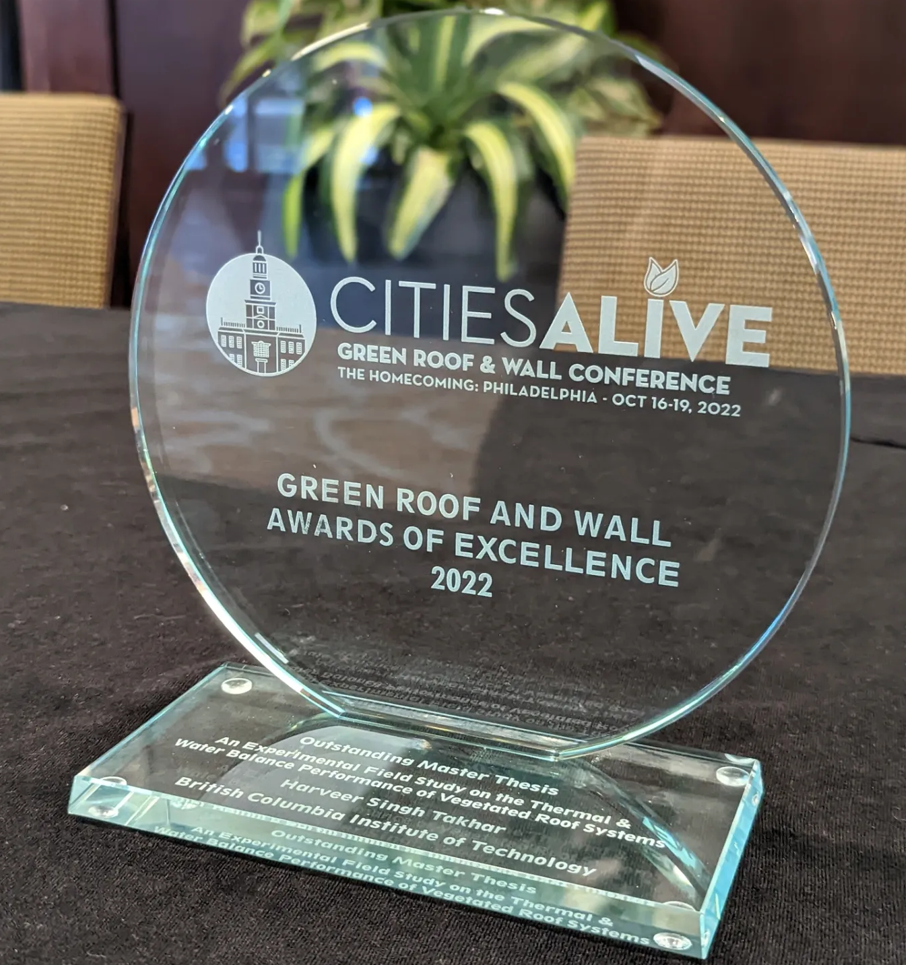Tackling climate change implications will need movement towards sustainability on many fronts. One of the mechanisms for combatting some of the implications of climate change include the implementation of green infrastructure. Inclusive are green roofs. Better yet, a connected blue-green roof.
Harveer (Harvy) Singh Takhar, a part-time BCIT Building Science/Building Engineering graduate student, spent a large part of the past three years of research connecting blue-green roof performance with the support of Dr. Rodrigo Mora, Faculty, BCIT Building Science Department.
The research
“The idea was to harvest the benefits of green roofs, while keeping them healthy by storing water considering most green roofs adversely affect building systems during the drought. So we added a water cavity, known as the blue roof component, that will feed the green roof portion with capillary irrigation, and it can draw water when it needs it,” says Harvy.
With a number of research partners, including the City of Vancouver, there is a public display of various roof assemblies at the Helena Gutteridge Plaza, just north of Vancouver City Hall. The assemblies include a conventional flat roof, a blue roof, a green roof, and a connected blue-green roof. The goal of the research was to analyze the stormwater performance and thermal response of the various roof assemblies.
Harvy and Dr. Mora also received CleanBC funding from the Government of British Columbia for another set of more heavily instrumented research roof assemblies. These assemblies were constructed at BCIT and are currently recording data. The assemblies were built in 2019 while the data collection and ongoing maintenance were taken care of between Harvy and Dr. Mora.
Harvy and Dr. Mora have presented the research at many past conferences that include: Ecocity World Summit, Adaptation Canada, Green Roofs for Healthy Cities, and Buildex Vancouver. The emergence of green solutions are well received and proven, with many standards and policies adjusting to accommodate them.
The thesis titled ‘An Experimental Field Study On The Thermal & Water Balance Performance Of Vegetated Roof Systems’ was published in early 2022. The thesis compared stormwater runoff data as well as temperature data of each type of roof assembly.

In October 2022, Harvy received the Jeffrey L. Bruce International Research Award at the Cities Alive conference in Philadelphia, Pennsylvania for the thesis. The award also came with another opportunity to present the research.
Harvy says “It was a great opportunity to present the thesis findings and meet like-minded individuals. There were a lot of industry professionals that took a keen interest in the study. Other research also integrated well with what we did at BCIT, and I am understanding how this solution can help sustain green roofs and harvest rainwater rather than sending it down the drains. We can help with policy decisions with the data and analysis that we have been able to take on.”

Advice For Future Students?
“Well firstly, don’t rush research! Take your time to ensure the analysis is conducted well. Also, let’s find methods to integrate nature-based solutions to our work, the rest of the success will follow,” advises Harvy.

Awesome job Harvy!